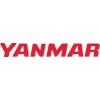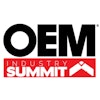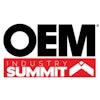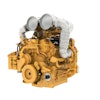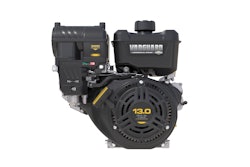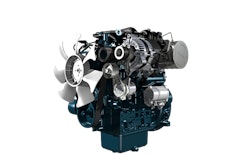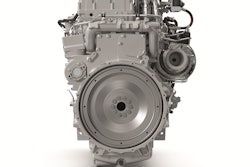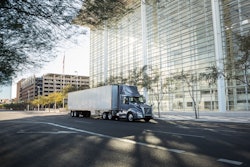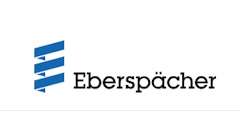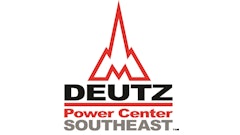The Rolls-Royce Power Systems business unit saw a significant increase in revenue and profit in the first half of 2019 compared with the same period of last year, despite the uncertain global economic situation. Adjusted revenue was up 6% to £1.553 billion (or €1.778 billion), while adjusted operating profit grew by 20% to £96 million (€109 million). Economically and strategically important projects and orders were the key factors determining the first half of 2019, which was also characterized by the further implementation of the PS 2030 future strategy. Beginning in autumn of this year, the Power Systems business unit will emphasize its affiliation with the British Rolls-Royce Group in its brand profile more clearly than it has done to date.
Gains in a difficult market
“We have done extremely well, in spite of the fact that we are currently going through challenging times,” says CEO Andreas Schell. The company’s traditional business in engines and systems featured an excellent order situation and continuing high order intake, also opening up new markets. To this end, Power Systems has entered into an in-depth partnership with XCMG, a Chinese manufacturer of mining vehicles and equipment, which will further improve its position in the Chinese market.
The power generation business segment made a major contribution to the new business in the first half of 2019, primarily with emergency standby systems for mission-critical facilities, such as data centers. This more than compensated for the expected decline in revenue from drive systems for the construction and agricultural sectors. This business segment had reported high revenues in the same period last year, since customers had ordered more engines than usual in anticipation of the coming into force of new emission regulations. “This mix of different markets gives us stability,” says Chief Financial Officer Wolfgang Widlewski in his analysis of the situation. “With a 15% increase in our order backlog amounting to £3.335 billion (€3.818 billion), we are sufficiently well financed to achieve a good full-year result.”
Increase in proportion of services
Revenue from services (up 7%) grew more than the traditional engine related business. This was due primarily to the 25% increase in the number of long-term maintenance contracts concluded and the increase in sales of replacement parts. “This shows that our customers no longer simply buy an engine or a drive system but tend increasingly to purchase a total package that includes maintenance, which offers them reliability and fail-safe stability with calculable costs,” says Schell. To improve its services, Power Systems has gone digital. There are now over 3,000 data loggers installed on MTU engines to collect data for digital analysis in order to prevent damage for example by providing early maintenance.
Traditional business supports transformation
“Our traditional business, primarily in diesel based drive systems, it is not only our number one source of income at the moment, it is also the financial basis for our transformation from being an engine manufacturer to becoming a provider of integrated solutions and thus for our future path based on our PS 2030 strategy,” Schell emphasizes. “Investments in our electrification and hybrid strategy and in new engines have subsequently led to a rise in R&D expenditure amounting to £8 million (€9 million), which corresponds to a 10% increase.”
The Rolls-Royce business unit has already celebrated some initial success with new products designed specifically for integrated solutions: “Orders for 13 MTU Hybrid PowerPacks for railcars from the United Kingdom and the Republic of Ireland, for example, show that it is both important and also the right strategy to invest in future technologies and to have staying power,” says Schell. And for the Baden-Württemberg Ministry of Transport, Rolls-Royce Power Systems is currently working on a feasibility study on the use of the MTU Hybrid PowerPack drive system for regional trains in south-west Germany.
A proprietary microgrid as of autumn
“We took another major step forward on our way to becoming a solution provider when the first microgrid was commissioned for the German automotive components supplier Winkelmann in Ahlen,” says Schell. With MTU CHP plants for the production of heat and power combined with battery containers, in addition to a solar plant in the near future, this is the first microgrid in which Power Systems has been involved beyond the supply of components. The first proprietary microgrid is currently being built on the company’s premises in Friedrichshafen and will be completed in autumn. In the associated validation centre, individual combinations of various energy sources connected to a common control system will be demonstrated to customers. A second proprietary microgrid is being installed at MTU’s plant in Aiken (USA).
“Our microgrid developments are being met with considerable interest on the global market,” says a delighted Schell. For the MTU battery container that was launched in spring, the company is already working on several dozen offers for potential customers. In collaboration with its partner Qinous, Rolls-Royce will also be offering battery containers under the MTU brand in future with capacities ranging from 30 to 2500 kVA and will thus open up new markets.
In addition to electrification and digitalization, Power Systems is also working on the use of alternative fuels, such as gases and liquid fuels obtained from renewable energy sources that can be used to achieve carbon-neutral operations.
The diesel remains indispensable
“We are not going to take our leave of the diesel but are convinced that it will in future continue to be an integral part of our product portfolio – in the medium term, however, to a lesser degree as is the case today. Because there is often no alternative, it is constantly being developed further and we have just recently presented the fifth generation of our MTU Series 4000 engine,” says Schell. Hybrid drive systems, gas engines, alternative fuels and possibly even fuel cells will in some cases replace it. “Whatever happens, however, we intend to offer our customers the most appropriate solution – often with, but more frequently without diesel. For this reason, we are changing and will be offering our customers new solutions and products we don’t yet have today. That will secure our future,” adds Schell.
With self-help to new specialists
Because the specialists required are difficult to obtain, however, the company is providing training that will enable some 100 engine specialists to become electrical engineering specialists and in this way is bundling its expertise for new products under its own roof. The training department, which is celebrating its 100th anniversary this year, is also on course for the future. The new training workshop, which will open in November, is equipped with an industrial 3D printer to ensure that young professionals are familiar with new manufacturing technologies right from the word go. The company is investing around one million euros in the future of its employee development, which enjoys a long and proud tradition of excellence.
New brand profile: MTU is part of Rolls-Royce
“In the 5 years since we became a 100% subsidiary of Rolls-Royce, we have established a strong position for ourselves within the group,” Schell emphasizes. “We are not only the second largest business unit, but also with our transformation, with our agile corporate culture and with the speed with which we have brought about the changes, we are regarded as an example for others to follow. Beginning in autumn, the business unit will appear with a modified brand profile – a balanced combination of the Rolls-Royce and MTU brands, with Rolls-Royce standing for the company and MTU standing for the brand of the products and integrated solutions.
“All our subsidiaries will in future include Rolls-Royce in their names. Consequently, in autumn we will be renaming the largest subsidiary, MTU Friedrichshafen GmbH, as the company which manufactures our product solutions, Rolls-Royce Solutions GmbH. Our products and solutions will continue to be marketed under the MTU brand name and will bear the MTU logo combined with the text supplement 'A Rolls-Royce solution.' This is the brand name which our customers associate with us,” says Schell, explaining the step now being taken. The MTU Onsite Energy brand for energy solutions will be integrated into MTU. New lettering on the buildings, new working clothes and, beginning in autumn, a new website will be the first steps taken for the new brand profile.
